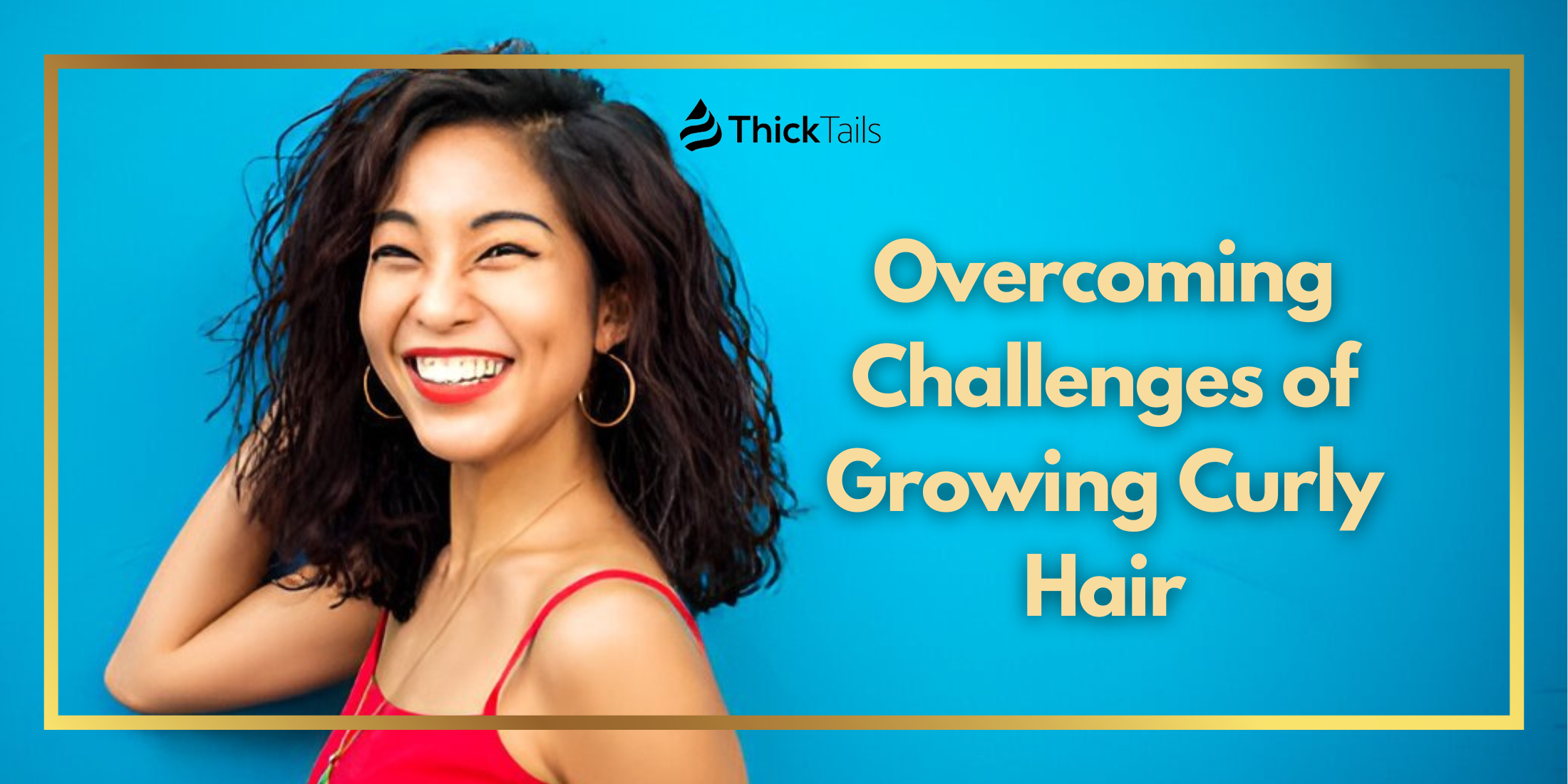As women, we face many challenges throughout our lives - menopause, postpartum recovery, and stress are just a few of them. However, one challenge that may not be talked about as often is the struggle to grow and maintain curly hair. Caring for curly hair can feel like an uphill battle at times with its unique texture and needs. But fear not, you are not alone in this journey! In this blog post, we will dive into the world of curly hair care and share tips on how to overcome common challenges faced by women during different stages of life. Whether you're dealing with hormonal changes or simply trying to manage stress-induced hair fall, keep reading for expert advice on achieving healthy and luscious curls.
I. Understanding the Unique Needs of Curly Hair

Curly hair can be a blessing, but it can also be a challenge if you're not sure how to properly care for it. Understanding the unique needs of curly hair is essential for keeping it healthy and beautiful. Unlike straight hair, curly hair is prone to dryness and frizz, which means it requires special attention when it comes to washing, conditioning, and styling. It's important to use products that are specifically designed for curly hair and to avoid using harsh chemicals that can strip its natural moisture. With the right care, curly hair can be just as stunning and manageable as any other hair type.
a. The Science Behind Curly Hair Growth
Curly hair has been a topic of interest for scientists and hair enthusiasts alike, as there seems to be a unique science behind its growth. One of the key factors in the development of curly hair is the shape of the hair follicle. Compared to straight hair, curly hair follicles have a more elliptical shape, causing the hair to grow in a spiral pattern. Additionally, the amount and distribution of proteins in curly hair differ from that in straight hair, causing it to be more susceptible to damage and frizz. To maintain healthy and vibrant curls, it is important to understand the intricate science behind curly hair growth and care for it accordingly.
b. Common Issues Faced by Curly Hair
Curly hair can be a blessing and a curse. On one hand, it's unique, voluminous, and bouncy. On the other hand, it can be challenging to maintain and style. One of the most common issues faced by those with curly hair is frizz. Curly hair is more prone to frizz due to its dryness and the difficulty of distributing natural oils down the hair shaft. Another common problem is tangles. Curly hair tends to have more knots and tangles than straight hair because of its texture. Additionally, finding the right products and techniques to define and enhance curls can be a struggle. It's essential to use products specifically designed for curly hair and to avoid ingredients that can strip natural oils. With proper care and attention, anyone with curly hair can rock their unique and gorgeous locks confidently.
c. Differences in Hair Growth Cycles for Curly Hair
Curly hair may seem like a mystery to those who don't have it. Understanding the differences in the hair growth cycles for curly hair can help shed some light on why curls behave the way they do. Unlike straight hair, curly hair is prone to dryness and breakage, which may be due to its coiled shape. During the anagen phase of the hair growth cycle, the hair follicle produces cells that lend themselves to curlier, coarser hair. Curly hair also tends to have a shorter anagen phase than straight hair, meaning that it spends less time growing and more time in the resting and shedding phases. This can result in a slower growth rate for curly hair and less overall length. By understanding the unique growth patterns of curly hair, individuals with this hair type can tailor their hair care routine to keep their curls healthy and vibrant.
II. Effective Strategies for Growing Long, Healthy Curls
Maintaining long, healthy curls requires a targeted approach to hair care. Investing in quality hair care products specifically designed for curly hair is a great place to start. Consider using a sulfate-free shampoo and a deep conditioning treatment on a regular basis to keep your curls hydrated and well-nourished. Regularly trimming your curls can also help prevent split ends and breakage. In addition, try to avoid excessive heat styling and harsh chemicals, as they can damage and weaken your curls over time. By incorporating these effective strategies into your hair care routine, you can achieve and maintain long, beautiful curls that are full of life and bounce.
a. Optimal Hair Care Routines
Optimal hair care routines are essential for maintaining healthy, voluminous hair. It starts with selecting the right shampoo and conditioner that caters to your hair type. For those with curly hair, it's important to choose products that hydrate and define the curls, preventing unwanted frizz. In addition to shampoo and conditioner, a serum can provide an extra boost of nourishment, leaving your hair soft and shiny. Incorporating these simple steps into your routine can promote the overall health and appearance of your hair.
b. Protective Hairstyles and Techniques
Curly hair, though beautiful and unique, can often be a bit more high-maintenance than other hair types. Protective hairstyles and techniques can be a lifesaver for those with curly hair who want to keep their locks looking healthy and strong. From braids to twists to buns, protective styles help to minimize breakage and damage caused by daily styling and environmental stressors. Additionally, incorporating protective techniques such as using a satin pillowcase or avoiding excessive heat can further enhance the overall health and appearance of curly hair. By taking the time to implement these strategies, those with curly hair can enjoy their natural curls without sacrificing their hair's health and longevity.
c. Nighttime Routines for Curl Protection
A nighttime routine focused on curl protection can make all the difference in how healthy and vibrant your curls look the next day. You'll want to start by using a gentle shampoo and conditioner that nourishes your hair without stripping it of natural oils. Once your hair is towel-dried, apply a serum that helps to lock in moisture and protect against breakage. Don't underestimate the power of supplements either. Certain vitamins and minerals can promote healthy hair growth and improve the overall health of your curls. By incorporating these steps into your nighttime routine, you can wake up to curls that are well-protected, bouncy, and full of life.
III. Enhancing Hair Health with Nutrition and Products

Hair health is often a reflection of overall health, and nutrition plays a vital role in maintaining a glossy and voluminous head of hair. Nutrient-rich foods, such as salmon, avocado, and nuts, nourish hair from within and help in the production of keratin, which is the primary constituent of hair. In addition to dietary changes, the incorporation of hair care products that promote hair health can also work wonders. Products containing vitamins B and E, biotin, and zinc stimulate hair growth and help in keeping hair shiny and hydrated. With the right combination of nutrition and hair care products, you can transform your hair and give it a healthy and radiant glow.
a. Dietary Supplements for Hair Growth
Hair is an important part of our appearance and taking care of it is equally important. Opting for dietary supplements for hair growth is a highly recommended step towards nourishing your locks from the inside out. Nowadays, it can be quite challenging to consume all the nutrients your curly hair needs to thrive. Thankfully, hair supplements offer a convenient and effective solution. These supplements are packed with vital ingredients such as biotin, collagen, and vitamin E which help to strengthen and promote hair growth. While you may not achieve overnight results, regular use of hair supplements coupled with a healthy diet and proper hair care can help you achieve the luscious, healthy curls you desire.
b. Choosing the Right Hair Products
Choosing the right hair products can make all the difference in maintaining healthy, vibrant locks. This is especially true for those with curly hair, as the right products can enhance curl definition and reduce frizz. It's important to choose a shampoo and conditioner formulated for your hair type, whether it's curly, straight, or somewhere in between. Additionally, a serum can provide extra moisture and nourishment for curly hair. It's important to read labels and ingredients to determine what will work best for your individual needs. With the right products and a little bit of care, you can achieve the healthy, luscious curls you've always wanted.
c. Paraben-Free and Natural Product Recommendations
If you're someone with curly hair, you know the struggle of finding the right products that won't weigh down your curls or make them frizz up like a poodle. And if you're someone who also pays attention to the ingredients in your hair care products, the search can feel even more daunting. But fear not, because there are plenty of paraben-free and natural options out there that work wonders for curly hair. When it comes to supplements, look for ones with biotin and folic acid. For shampoo and conditioner, choose ones with nourishing ingredients like coconut oil and shea butter. And when it comes to serum, try ones that include argan oil or jojoba oil to add shine and reduce frizz. With these recommendations and a little experimenting, you'll be on your way to having healthier and happier curls.
In conclusion, understanding the unique needs of curly hair is essential for achieving long and healthy locks. By delving into the science behind curly hair growth, we have learned that it is a combination of genetics and hair structure that determines our curl pattern. We have also identified common issues faced by those with curly hair and how they can impact the growth cycle. However, armed with this knowledge, we can implement effective strategies to promote healthier curls. This includes adopting optimal hair care routines, such as using sulfate-free shampoos and conditioners, and incorporating protective hairstyles and techniques to minimize damage. It is also important to take care of our curls at night by following a proper bedtime routine to preserve our curls' shape and moisture. But it's not just about external care – nutrition also plays a vital role in promoting hair health. By incorporating dietary supplements like biotin and omega-3s for nourishment from within, we can support our natural curls' growth. And when it comes to choosing the right products for our curls, remember to opt for paraben-free and natural options to prevent any potential harm or irritation. With these tips in mind, we can achieve beautiful, long, and healthy curls that are truly unique and tailored to us. So let's embrace our natural curl patterns, take good care of them, and watch them flourish with these effective strategies!







